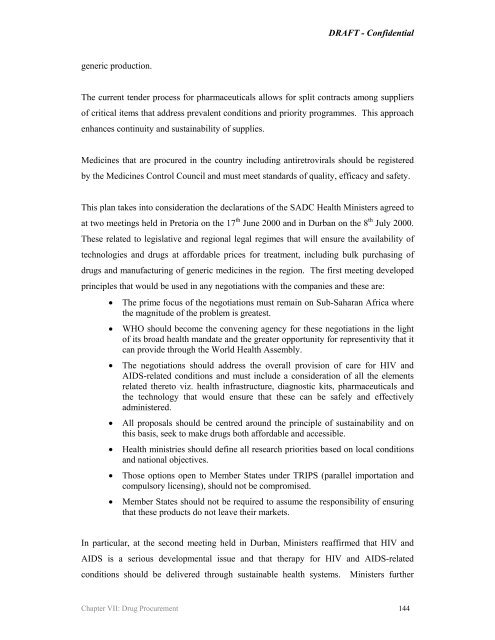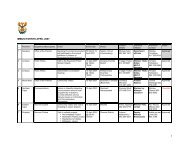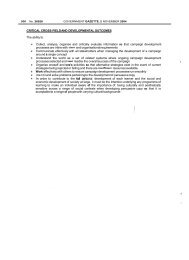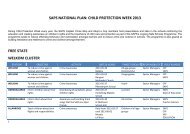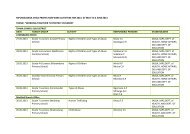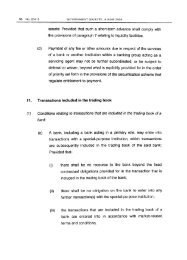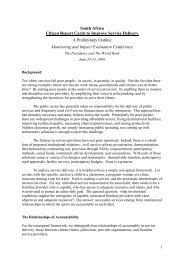Operational plan for comprehensive HIV and AIDS care and ...
Operational plan for comprehensive HIV and AIDS care and ...
Operational plan for comprehensive HIV and AIDS care and ...
You also want an ePaper? Increase the reach of your titles
YUMPU automatically turns print PDFs into web optimized ePapers that Google loves.
DRAFT - Confidential<br />
generic production.<br />
The current tender process <strong>for</strong> pharmaceuticals allows <strong>for</strong> split contracts among suppliers<br />
of critical items that address prevalent conditions <strong>and</strong> priority programmes. This approach<br />
enhances continuity <strong>and</strong> sustainability of supplies.<br />
Medicines that are procured in the country including antiretrovirals should be registered<br />
by the Medicines Control Council <strong>and</strong> must meet st<strong>and</strong>ards of quality, efficacy <strong>and</strong> safety.<br />
This <strong>plan</strong> takes into consideration the declarations of the SADC Health Ministers agreed to<br />
at two meetings held in Pretoria on the 17 th June 2000 <strong>and</strong> in Durban on the 8 th July 2000.<br />
These related to legislative <strong>and</strong> regional legal regimes that will ensure the availability of<br />
technologies <strong>and</strong> drugs at af<strong>for</strong>dable prices <strong>for</strong> treatment, including bulk purchasing of<br />
drugs <strong>and</strong> manufacturing of generic medicines in the region. The first meeting developed<br />
principles that would be used in any negotiations with the companies <strong>and</strong> these are:<br />
• The prime focus of the negotiations must remain on Sub-Saharan Africa where<br />
the magnitude of the problem is greatest.<br />
• WHO should become the convening agency <strong>for</strong> these negotiations in the light<br />
of its broad health m<strong>and</strong>ate <strong>and</strong> the greater opportunity <strong>for</strong> representivity that it<br />
can provide through the World Health Assembly.<br />
• The negotiations should address the overall provision of <strong>care</strong> <strong>for</strong> <strong>HIV</strong> <strong>and</strong><br />
<strong>AIDS</strong>-related conditions <strong>and</strong> must include a consideration of all the elements<br />
related thereto viz. health infrastructure, diagnostic kits, pharmaceuticals <strong>and</strong><br />
the technology that would ensure that these can be safely <strong>and</strong> effectively<br />
administered.<br />
• All proposals should be centred around the principle of sustainability <strong>and</strong> on<br />
this basis, seek to make drugs both af<strong>for</strong>dable <strong>and</strong> accessible.<br />
• Health ministries should define all research priorities based on local conditions<br />
<strong>and</strong> national objectives.<br />
• Those options open to Member States under TRIPS (parallel importation <strong>and</strong><br />
compulsory licensing), should not be compromised.<br />
• Member States should not be required to assume the responsibility of ensuring<br />
that these products do not leave their markets.<br />
In particular, at the second meeting held in Durban, Ministers reaffirmed that <strong>HIV</strong> <strong>and</strong><br />
<strong>AIDS</strong> is a serious developmental issue <strong>and</strong> that therapy <strong>for</strong> <strong>HIV</strong> <strong>and</strong> <strong>AIDS</strong>-related<br />
conditions should be delivered through sustainable health systems. Ministers further<br />
Chapter VII: Drug Procurement 144


